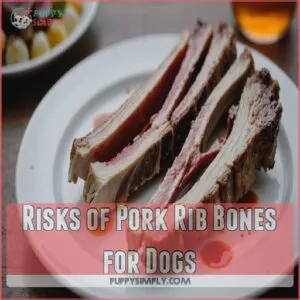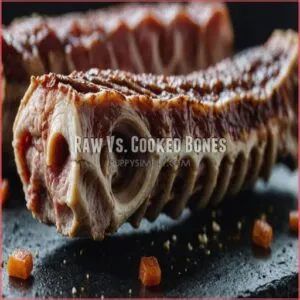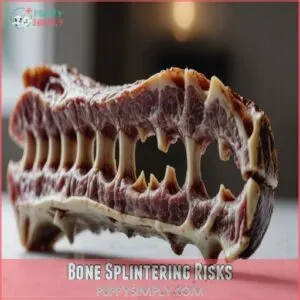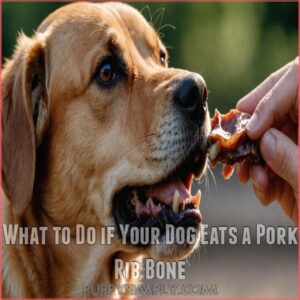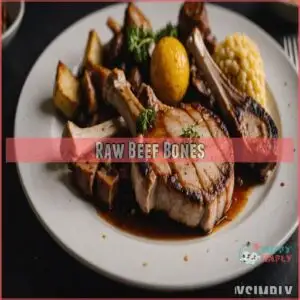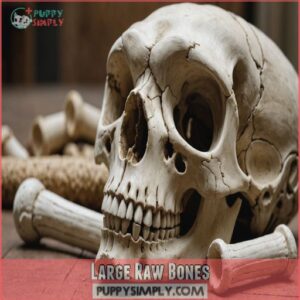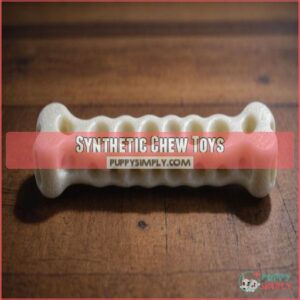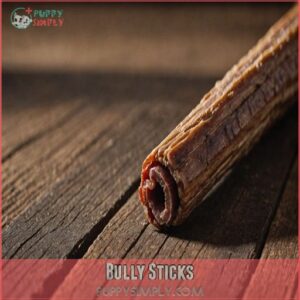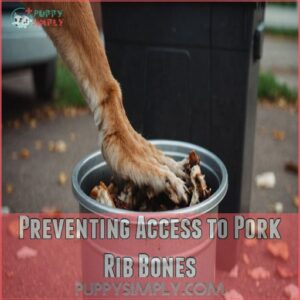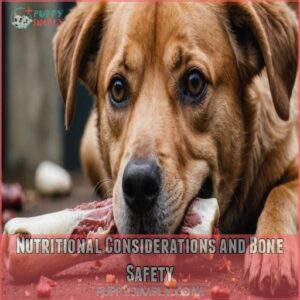This site is supported by our readers. We may earn a commission, at no cost to you, if you purchase through links.
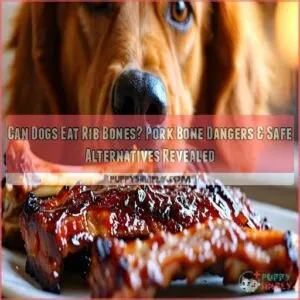 No, you shouldn’t let your dog eat pork rib bones.
No, you shouldn’t let your dog eat pork rib bones.
It’s like giving a toddler a handful of toothpicks – a recipe for disaster!
These bones can splinter easily, turning into sharp shards that might injure your pup’s mouth, throat, or digestive tract.
Even if your dog’s giving you those irresistible puppy eyes, stay strong!
The risks of choking, intestinal blockages, or even pancreatitis from the fatty meat aren’t worth it.
Your furry friend’s safety comes first, so it’s best to keep those tempting ribs out of reach.
Don’t worry, though – there are plenty of safe, dog-friendly alternatives that’ll keep your pooch happy and healthy.
Stick around to discover some tail-wagging options!
Table Of Contents
- Key Takeaways
- Risks of Pork Rib Bones for Dogs
- Why Pork Rib Bones Are Not Safe
- What to Do if Your Dog Eats a Pork Rib Bone
- Safe Alternatives to Pork Rib Bones
- Preventing Access to Pork Rib Bones
- Nutritional Considerations and Bone Safety
- Frequently Asked Questions (FAQs)
- Can I give my dog a pork rib bone?
- Which pork bones are safe for dogs?
- What bones are safe for dogs to eat?
- Can you eat pork rib bones?
- Are some breeds more likely to chew bones safely?
- How long can dogs safely chew on approved bones?
- Can puppies eat any type of bone safely?
- Do dental chews provide the same benefits as bones?
- Are there any health benefits to giving dogs bones?
- Conclusion
Key Takeaways
- You shouldn’t give your dog pork rib bones; in fact, even cooked pork bones are a hazard; they splinter, causing choking and internal injuries.
- Raw or cooked, pork bones can lead to issues like choking and blockages due to their shape and size, as seen with cooked pork chop bones. Raw or cooked, pork bones pose risks of intestinal blockages, dental damage, and pancreatitis.
- If your dog eats a pork rib bone, it’s essential to be aware of the risks associated with pork bone dangers, watch for vomiting, loss of appetite, abdominal pain; contact your vet immediately if you see these signs.
- Safe alternatives to pork rib bones include opting for raw bones, such as those from a butcher, which are safer than cooked lamb bones. Safe alternatives to pork rib bones include raw beef bones, large raw bones from a butcher, synthetic chew toys, and bully sticks.
Risks of Pork Rib Bones for Dogs
You might think tossing your dog a pork rib bone is a treat, but it’s actually playing fetch with danger.
These bones can splinter into sharp shards, potentially causing choking, internal injuries, or even a trip to the doggy ER.
Choking Hazards
Pork rib bones are a ticking time bomb for your furry friend.
These seemingly innocent treats can turn into a choking nightmare faster than you can say "fetch."
Imagine this: your pup, excited for a tasty snack, gnaws on a rib bone.
Suddenly, it splinters, creating sharp shards that can lodge in their throat.
Don’t risk it!
Stick to safe chew toys designed for dogs, and you’ll avoid this bone-chilling hazard.
Intestinal Blockages
While choking’s a clear danger, let’s not forget about the silent threat lurking in your pup’s belly.
Rib bones can wreak havoc on your dog’s insides, causing intestinal blockages that’ll have you both howling in distress.
If you suspect your dog has ingested a rib bone, you should be aware of the potential risks associated with pork bone dog risk.
Here’s what you need to watch for:
- Vomiting or dry heaving
- Loss of appetite
- Abdominal pain or swelling
- Constipation or difficulty pooping
Don’t wait for these symptoms to worsen. If you suspect a blockage, it’s vet time, pronto!
Dental Damage
Beyond the risk of blockages, your pup’s pearly whites are in danger too.
Chewing on hard pork rib bones can crack or chip teeth, leaving your furry friend in pain.
Imagine biting down on a rock – ouch!
Splinters from these bones can also cut gums and tongues, turning mealtime into a dental disaster.
Keep your dog’s smile bright by opting for safer chew toys designed for canine oral health.
Pancreatitis Risk
Did you know that pork rib bones can be a ticking time bomb for your dog’s pancreas?
These fatty treats are like a fast track to pancreatitis, a painful inflammation that’ll have your furry friend feeling under the weather.
Here’s what you need to watch out for:
- Sudden loss of appetite (even for their favorite snacks)
- Vomiting or diarrhea (nobody wants that mess)
- Abdominal pain (they might yelp when you touch their tummy)
- Lethargy (your usually bouncy pup turns into a couch potato)
Why Pork Rib Bones Are Not Safe
You might think those pork rib bones are a tasty treat for your pup, but they’re actually a recipe for disaster.
Whether raw or cooked, pork rib bones can splinter easily, posing serious risks of choking, internal injuries, and even bacterial infections for your furry friend.
Raw Vs. Cooked Bones
Many dog owners wonder about the safety of raw vs. cooked bones.
Here’s the scoop: neither is safe for your furry friend.
Raw pork bones can harbor bacteria, leading to nasty digestive problems.
Cooking doesn’t make them safer – it actually makes them more dangerous!
Heat weakens the bone structure, increasing the risk of splintering.
Your pup’s health isn’t worth the gamble, so it’s best to avoid pork bones altogether.
Bone Splintering Risks
Now, let’s talk about why pork rib bones are a no-go for your furry friend.
Cooked or raw, these bones can splinter into sharp shards, causing serious harm.
Here’s why you should keep them off your pup’s menu:
- They can pierce your dog’s digestive tract
- Splinters may cause internal bleeding
- Bone fragments can lead to painful bowel obstructions
- Even small splinters can damage teeth and gums
Remember, your dog’s safety is worth more than a moment of chewing pleasure!
Bacterial Growth
Bacteria love to party on raw pork bones, turning your pup’s treat into a potential health hazard.
You’ve got to handle these bones like a pro chef, practicing excellent food safety.
Store ’em in the fridge, and don’t let them hang around for more than a few days.
Cross-contamination is a real risk, so keep those bones away from other foods.
Remember, even cooked pork bones aren’t off the hook – they can still harbor nasty bugs.
What to Do if Your Dog Eats a Pork Rib Bone
Uh-oh, your pup’s gotten into the rib bones?
Don’t panic, but quick action is key to keeping your furry friend safe.
Let’s walk through the steps you need to take right now to protect your dog and when it’s time to call in the pros.
3 Immediate Steps
Uh-oh! Your pup’s gotten into the rib bones.
Don’t panic, but act fast.
Here’s what you need to do right away:
- Remove any remaining bones from your dog’s reach
- Check your dog’s mouth for visible bone fragments
- Call your vet immediately for professional advice
Remember, even if your furry friend seems fine, those sneaky pork bone splinters can cause trouble later.
Stay calm and follow your vet’s guidance to keep your pooch safe and sound.
Watch Your Dog Closely
With your pup’s safety at stake, keep a hawk-like watch on them.
Monitor their behavior closely for the next 24 hours.
You’re looking for any unusual patterns that might spell trouble.
Here’s a handy guide to help you stay on top of things:
| Time Period | What to Watch For | Action |
|---|---|---|
| First 2 hours | Chewing patterns, potential choking | Stay close, be ready to act |
| 2-12 hours | Appetite changes, restlessness | Offer water, comfort |
| 12-24 hours | Bathroom habits, energy levels | Note any irregularities |
Remember, you’re your dog’s best advocate.
Trust your gut and don’t hesitate to call the vet if something seems off.
Signs of Distress
As you keep an eye on your pooch, be on high alert for telltale signs of trouble.
Your furry friend might start vomiting, have diarrhea, or seem unusually tired.
If they’re pawing at their mouth, gagging, or showing signs of abdominal pain, it’s time to worry.
Bone splinters can wreak havoc on your dog’s digestive system, so don’t ignore these red flags.
Stay calm, but be ready to act if your pup’s behavior seems off.
When to Contact a Veterinarian
Your furry friend‘s unusual behavior after eating a pork bone shouldn’t be ignored.
If your dog has ingested a bone, be aware that cooked bones can splinter easily.
Call your vet immediately if you notice these red flags from bone splinters causing trouble:
- Repeated vomiting or dry heaving within 2-3 hours
- Drooling excessively while pawing at the mouth
- Signs of abdominal pain, like a hunched posture
- Bloody stool or severe diarrhea
- Loss of appetite lasting more than 12 hours
It’s always best to err on the side of caution when it comes to your pup’s health!
Safe Alternatives to Pork Rib Bones
If you’re looking to keep your pup happy and safe, you’ll be glad to know there are plenty of excellent alternatives to those risky pork rib bones.
From durable synthetic chew toys to naturally digestible bully sticks, if you’re looking for safe alternatives to rib bones, you can consider raw beef bones like knuckle bones, you can give your furry friend something satisfying to chew on without worrying about dangerous splinters or blockages.
Raw Beef Bones
Three incredible benefits make raw beef bones a fantastic alternative to pork rib bones.
They’re packed with nutrients, naturally clean, and provide hours of enrichment for your furry friend.
You can easily find and purchase raw beef bones from a reliable Online Raw Beef Bones Store.
Let’s break down the essential facts about raw beef bones to keep your pup safe and satisfied.
| Bone Type | Benefits | Safety Tips |
|---|---|---|
| Marrow Bones | Rich in nutrients | Supervise chewing |
| Knuckle Bones | Dental cleaning | Remove after 20 mins |
| Femur Bones | Mental stimulation | Store properly refrigerated |
| Joint Bones | Natural enzymes | Clean after use |
Large Raw Bones
Raw beef bones might be great, but large raw bones from your local butcher can be even better for your pup’s chewing pleasure. Think dinosaur-sized bones that’ll keep your furry friend entertained for hours!
- Choose bones nearly as big as your dog’s head to prevent choking
- Ask your butcher for fresh marrow bones or knuckle bones
- Store bones in the fridge between chewing sessions and after the pup has finished with them for the day.
- Replace bones after 4 days of use
- Clean all surfaces after handling raw bones, just like you would with raw meat
Synthetic Chew Toys
Modern synthetic chew toys offer a safe haven for determined chewers who need an outlet for their natural urges.
Consider durable options like the KONG Goodie Bone, which is featured among the best indestructible dog toys.
Look for durable nylon or rubber bones that’ll withstand powerful jaws while promoting dental health.
When shopping, you’ll want to prioritize size-appropriate toys made from non-toxic materials.
These alternatives provide the satisfaction of chewing without the risks associated with real bones.
Bully Sticks
While synthetic toys are great, natural bully sticks offer your pup a safer, digestible alternative to risky pork bones.
Made from dried beef muscle, these protein-packed chews won’t splinter like rawhide or bones.
You’ll love that they’re single-ingredient treats that keep your dog busy for hours, and they’re gentler on teeth than harder alternatives.
Plus, they’ll freshen your furry friend’s breath!
Preventing Access to Pork Rib Bones
If you’ve got a dog who thinks the trash can is a treasure chest, you’ll need to be extra vigilant about keeping those tempting pork rib bones out of reach.
Just like child-proofing your home, you’ll want to create a bone-proof environment by securing trash cans and teaching everyone in your household about the dangers of sharing table scraps.
Securing Trash Cans
Clever dogs can transform into furry ninjas when they smell those tempting pork bones in your trash. You’ll need to outsmart your four-legged friend by securing your garbage cans like Fort Knox. Consider investing in dog-proof containers that’ll keep those determined paws at bay, protecting your pup from dangerous bone encounters.
- Install childproof locks on outdoor bins to prevent midnight raids
- Use heavy-duty trash cans with secure, snap-tight lids
- Place garbage containers in a locked garage or shed
- Consider weighted bases or wall-mounted holders to prevent tipping
Supervising Mealtime
Just like securing your trash, staying alert during mealtimes prevents sneaky paw maneuvers.
Keep your dog in a separate room while you’re enjoying those BBQ ribs, and don’t leave plates unattended – even for a quick bathroom break.
Your four-legged friend might be an angel most days, but regarding tempting pork bones, they can turn into quite the little food ninja!
Educating Family Members
Teaching your family about bone safety tips is like building a protective circle around your furry friend.
Get everyone on board by explaining how pork bones can splinter and harm your dog’s digestive system.
Show them safer alternatives like Durable Dog Chew Toys that can keep your pup occupied and happy.
Make it a house rule to never feed table scraps, and show your family safe chew options instead.
You’ll sleep better knowing everyone’s committed to keeping your pup safe.
Nutritional Considerations and Bone Safety
While you might be tempted to toss your dog a juicy rib bone from your BBQ feast, it’s important to understand the safety considerations that come with bone-feeding.
You’ll need to weigh the potential benefits against serious risks, including choking hazards and digestive issues, to make an informed choice about your furry friend’s treats.
Large Raw Bones for Dogs
Every dog deserves a safe chewing experience, and large raw bones can be part of a healthy diet when you follow proper guidelines.
Like choosing the perfect tennis ball, selecting the right bone size matters for your furry friend’s safety.
When considering bones like raw pork ribs, be aware of the risks, such as harmful bacteria and parasites.
Raw beef knuckle bones should be larger than your dog’s muzzle.
Fresh bones from trusted butchers offer the best quality.
Freeze bones between uses to maintain freshness.
Avoid weight-bearing bones that could crack teeth.
Never feed cooked bones – they’re more likely to splinter.
Supervision and Monitoring
Regarding bone handling, you’ll want to keep a hawk’s eye on your furry friend.
Monitor your dog closely while they chew, ensuring they don’t swallow large pieces.
Remove the bone after 10-15 minutes to prevent overindulgence.
Here’s a quick guide to help you stay on top of your pup’s chewing habits:
| Behavior | Action | Safety Level |
|---|---|---|
| Gentle chewing | Continue monitoring | Safe |
| Aggressive biting | Remove bone | Caution |
| Swallowing chunks | Intervene immediately | Danger |
| Disinterest | Offer alternative toy | Safe |
Remember, responsible feeding and supervision are key to your dog’s health and safety.
Emergency Actions
In a bone-chilling emergency, quick action is essential.
If your dog’s chomping on a pork bone turns into a choking hazard, don’t panic.
Call your vet immediately for advice.
They might suggest inducing vomiting, but never do this without professional guidance.
Watch for signs of distress like gagging or pawing at the mouth.
If you can safely remove the bone, do so, but be careful of those pesky pork bone splinters.
Your pup’s safety comes first!
Other Uses for Pork Bones
While pork bones aren’t safe for your furry friend, don’t toss them just yet!
You can whip up a tasty bone broth that’ll make your soup sing.
Or, put those bones to work in your garden as a natural fertilizer.
Just remember, compost them properly to avoid attracting unwanted critters.
From stock to soil enrichment, pork bones have plenty of uses that’ll keep your kitchen savvy and your garden thriving.
Frequently Asked Questions (FAQs)
Can I give my dog a pork rib bone?
Don’t play with fire!
Pork rib bones are a no-go for your furry friend.
They’re like ticking time bombs, prone to splintering and causing serious harm.
Stick to safer chew toys to keep your pup happy and healthy.
Which pork bones are safe for dogs?
Unfortunately, no pork bones are safe for dogs.
They’re all risky, whether raw or cooked.
Pork bones can splinter easily, causing choking or internal injuries.
It’s best to stick with safer chew toys designed specifically for dogs.
What bones are safe for dogs to eat?
Large, raw beef or lamb bones are your best bet for safe dog chewing.
They’re less likely to splinter than cooked or smaller bones.
But remember, no bone is 100% safe.
Always supervise your pup’s chew time.
Can you eat pork rib bones?
While pork ribs tempt your taste buds, their bones pose a serious risk.
You shouldn’t eat pork rib bones as they can splinter, causing choking or internal injuries.
Stick to savoring the meat and leave those bones on the plate.
Are some breeds more likely to chew bones safely?
Certain breeds, like Labradors and Golden Retrievers, tend to be gentler chewers, making bone-chewing potentially safer.
However, individual temperament matters more than breed.
You’ll need to supervise closely, regardless of your dog’s breed, to make sure safe chewing habits are established.
How long can dogs safely chew on approved bones?
Picture a dog’s bone as an hourglass – time’s ticking.
You’ll want to limit chewing sessions to 10-15 minutes, removing the bone after.
This prevents overindulgence and keeps your pup’s chompers safe.
Always supervise and replace worn bones.
Can puppies eat any type of bone safely?
Puppies shouldn’t eat bones, period.
Their growing teeth and delicate digestive systems can’t handle them safely.
Instead, offer soft chew toys designed for puppies.
As they grow, you’ll need to reassess their chewing needs with your vet.
Do dental chews provide the same benefits as bones?
Dental chews help maintain your dog’s oral health by reducing plaque and tartar.
They don’t offer the same mental stimulation or jaw exercise as bones.
Always choose appropriately sized chews to prevent choking hazards.
Are there any health benefits to giving dogs bones?
You might worry about giving dogs bones, but raw, large, meaty bones can promote dental health, provide mental stimulation, and offer a natural source of minerals.
Always supervise bone-chewing to prevent choking or splintering risks.
Conclusion
Surprisingly, nearly 60% of dog owners admit they don’t know that pork rib bones can cause serious choking hazards and blockages. Surprisingly, nearly 60% of dog owners admit they don’t know that pork rib bones pose dangers.
It’s important to remember that while your dog may beg for them, the risks are too high.
From choking hazards to potential bacterial infections, the dangers are real and serious.
Instead of wondering, "can dogs eat rib bones pork," consider offering safe, dog-approved alternatives like raw beef bones or bully sticks.
Keeping your furry friend safe and satisfied is always the best choice.

